How Big Should My Garden Be To Feed Family?
Looking for a simple garden plan that allows you to grow some, most, or nearly all of your family's food this year?
Growing your own food is easier than you might think. And as you will see with the simple, all-purpose garden plan below, it really can help to feed your family in a big way.
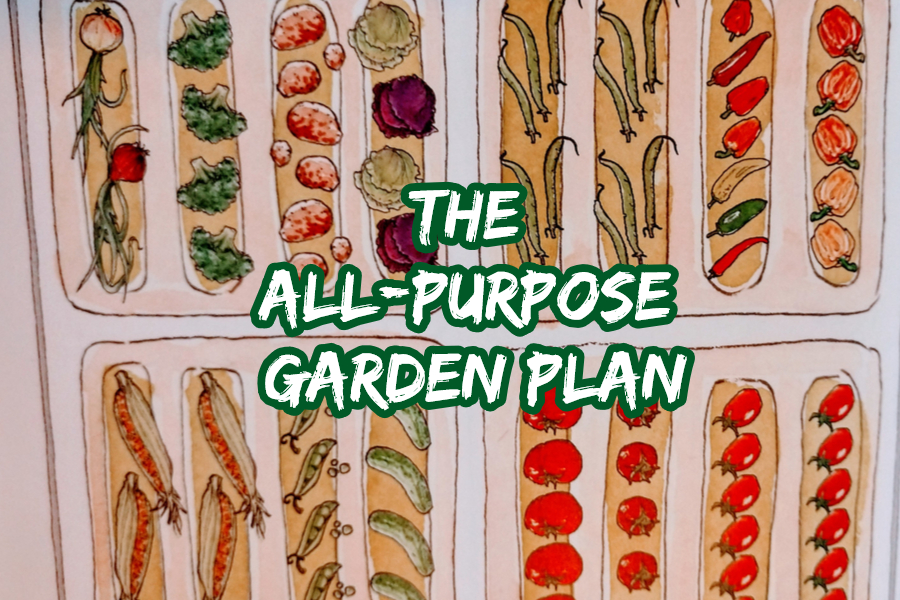
And in this fast changing world, growing your own food has never made more sense than right now.
Getting Back To Gardening…
Recent events have certainly made people think more than ever about our food supply chain. And what better way to help solve the food issue than by growing your own?
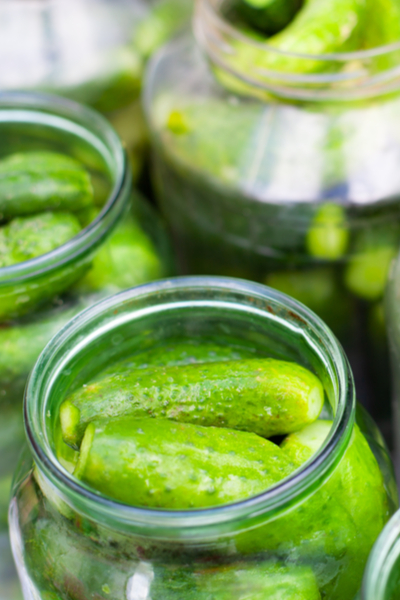
We have been growing nearly three quarters of our food for going on 10 years now. All with a simple, 40′ x 60′ low-maintenance raised row garden that lets us grow the vegetables we love.
Why Gardening Makes Cents and Sense!
Growing food in our organic garden has always made sense to us for so very many reasons.
First and foremost, it provides our family with healthy, nutritious food. Food that in addition to being consumed fresh, can be canned, stored and preserved for use the whole year round.
And because we grow it, we know exactly what is in it. But maybe more importantly, what's not! Like harmful chemicals and sprays.
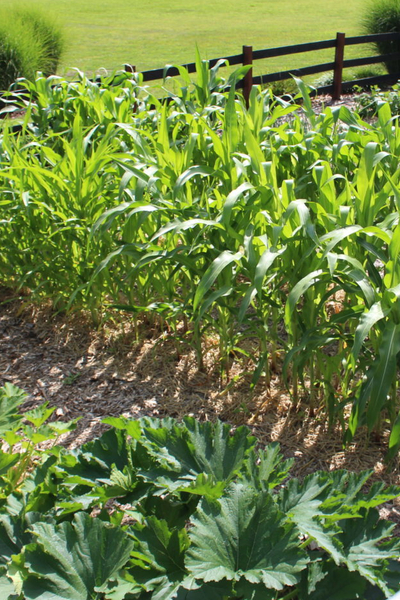
But growing our food also been a great way to keep our family budget under control. It's simple. Less trips to the grocery means less cash out of pocket. And back in the days when we were feeding four teenage children, that was a big plus!
But perhaps best of all, having a garden as always been an incredible way for us to get outdoors, exercise, and stay healthy. And what can be better than that!
A Simple Garden Plan To Grow Your Family's Food
So the big question is how much do you have to grow to feed the average family? It can vary for sure, but as a great guide, we have included a simple garden plan below based on feeding a family of four.
It can, however, be easily scaled to fit any size family, simply by adding or deleting rows. The real key of the below plan is to give a great starting point for knowing how many plants are needed for a good supply of food.
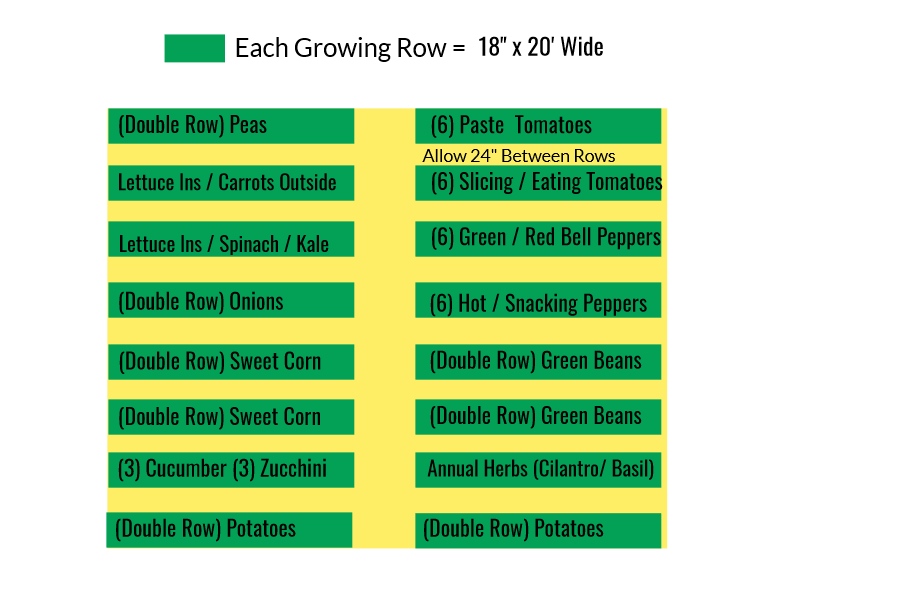
This 26′ x 40′ plan is set up for raised row planting, but can certainly be planted in a traditional garden setting too. With a total of (16) 18″ wide x 20′ long raised rows, it is also an extremely manageable garden. Especially when planted with raised rows.
Why Raised Rows?
If you are not familiar with no-till raised rows, be sure to check out our article How To Create The Perfect Raised Row Garden With Ease for a great overview. It can guide you through the entire process, and explain why it works so well for low-maintenance gardening.
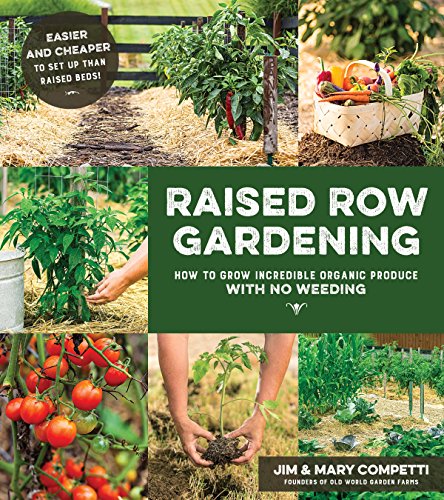
Raised Rows are quite simply the easiest and most simple way to garden. They grow a lot of food in a small space, and cut weeding and other maintenance chores to near zero. They also happen to be a great way to start a garden for beginners and seasoned garden veterans alike.
A Simple Garden Plan To Feed A Family
The plan and suggested plant list below is created with big flavor, big production, and ease of growing in mind. It should produce more than enough to help feed an average family of four. Both for fresh eating, and for canning and preserving for year round supplies.
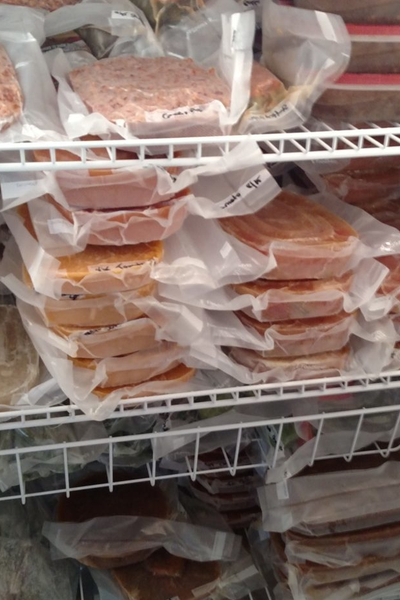
It is a garden that can help create everything from staples like corn and green beans, to fresh salads and soups, salsa, sauces and more.
It is intended as a solid starting point for those looking to provide fresh food for their family this year. To make the plan yours, simply sub out vegetables you don't like for those you do!
Plan & Plant List
The plant list below is based on the simple garden plan pictured earlier in the article. We have included it again below as a reference.

Along with the specific vegetables, we have included "best selections" for varieties that grow and produce well, or can be used for multiple food staples like soups, canning, etc.
Paste Tomatoes ( 6 Plants)
Paste tomatoes are perfect for canning and for making fresh salsa, pasta sauce and soups. They are also great for slicing up for salads and fresh eating. 6 plants will yield plenty for canning, soups and fresh eating. Best Varieties : San Marzano, Amish Paste
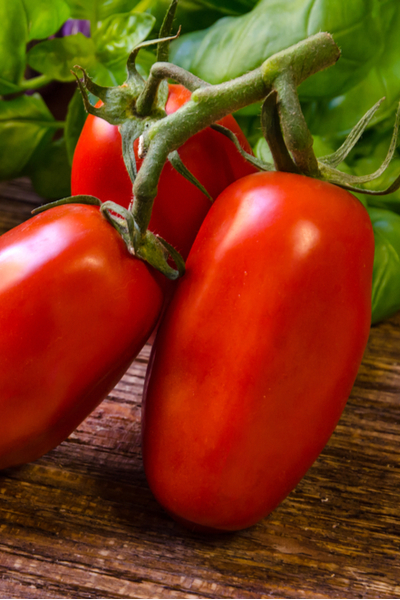
Heirloom Tomatoes ( 6 Plants )
These are the mainstay tomatoes full of flavor and size. They are great for fresh eating, hamburgers, and canning too! Best Varieties : Brandywine, Celebrity, Black Krim, Tiger Blush
Peppers (12 Plants)
For this garden plan there are 2 rows of peppers, one for large bell peppers, and one for smaller snacking peppers and hot peppers. Peppers are great for stuffing, fresh eating, salads, soups and more.
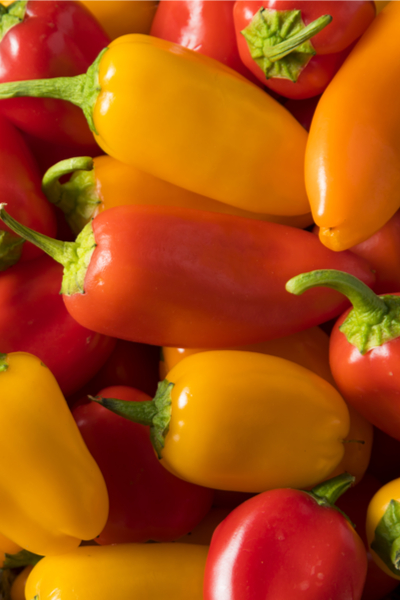
A good variety of 3 to 6 bell peppers, 3 snacking peppers, and a few hot varieties of peppers works well for most. Best Varieties : Green Pepper – California Wonder, Red Pepper – Italian Roaster, Snacking Pepper – Lunchbox Peppers.
Potatoes
Potatoes store well in a cool, dark location, so they are great for creating food over the winter. (2) 20′ rows of potatoes will produce a good amount for fresh eating and storing. Best Varieties To Grow : Yukon Gold
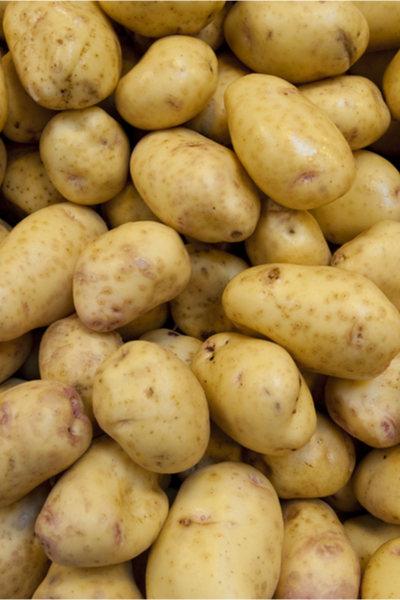
Sweet Corn
Great for fresh eating, and for storing and using in soups. (2) double rows will produce enough ears for all. Best Varieties : Peaches & Cream, Silver Queen
Green Beans
Green beans are an excellent crop to have for both fresh eating and preserving. Not only do they produce high yields, they can be replanted several times for multiple harvests each year. Best variety : Blue Lake Bush Green Beans
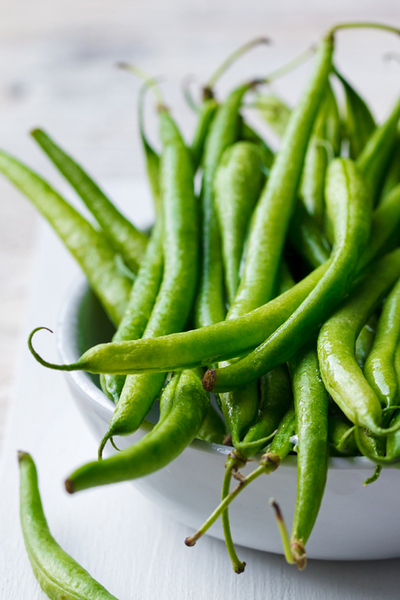
Zucchini / Cucumbers
Zucchini are great for stir fries and are a heavy producer. Cucumbers are perfect for all kinds of fresh eating, and for making pickles. Best Varieties : Boston Pickling for pickling, – Straight 8 for slicing.
Lettuce / Radish / Kale / Spinach / Spring Onions / Carrots
There are two rows for growing what we refer to as salad crops. These can be planted in succession for a continuous harvests from spring to fall. Carrots and spring onions are great to plant on the outside edge of the rows to have as needed throughout the year.
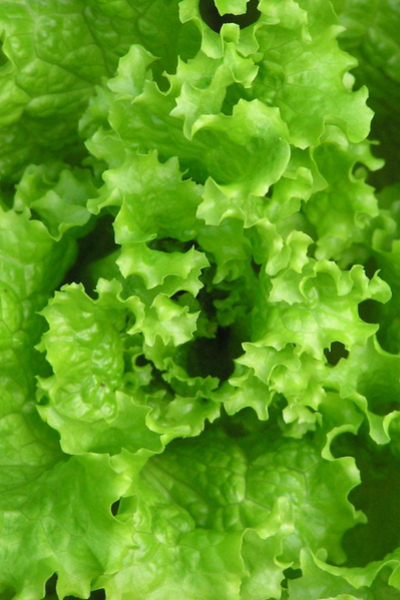
Peas
You can grow sugar snap peas in the early spring, or traditional green peas. Both are high in nutrition and great for all kinds of meal preps. Favorties : Snow Peas : Sugar Pod Peas – Green Peas : Alaska Shelling Peas
Onions
Sweet Onions and yellow onions, like potatoes, store well and can be used in so many dishes. They are easy to plant in sets, and can usually be found at local garden centers in the spring.
Grow Your Own Food This Year!
So how about making this the year you start a garden or expand your own to grow more of your family's food!
Use this simple garden plan as a starting point, and adjust it for the vegetables you love, and that your family eats the most.
And if you want to find out even more on Raised Row Gardening, check out Raised Row Gardening – The Book. The 200+ page comprehensive guide is dedicated to perfecting the art of simple gardening.
Here is to growing your food this year with a simple garden plan! Happy Gardening – Jim & Mary


How Big Should My Garden Be To Feed Family?
Source: https://oldworldgardenfarms.com/2020/03/15/simple-garden-plan/
Posted by: martindanythe.blogspot.com

0 Response to "How Big Should My Garden Be To Feed Family?"
Post a Comment